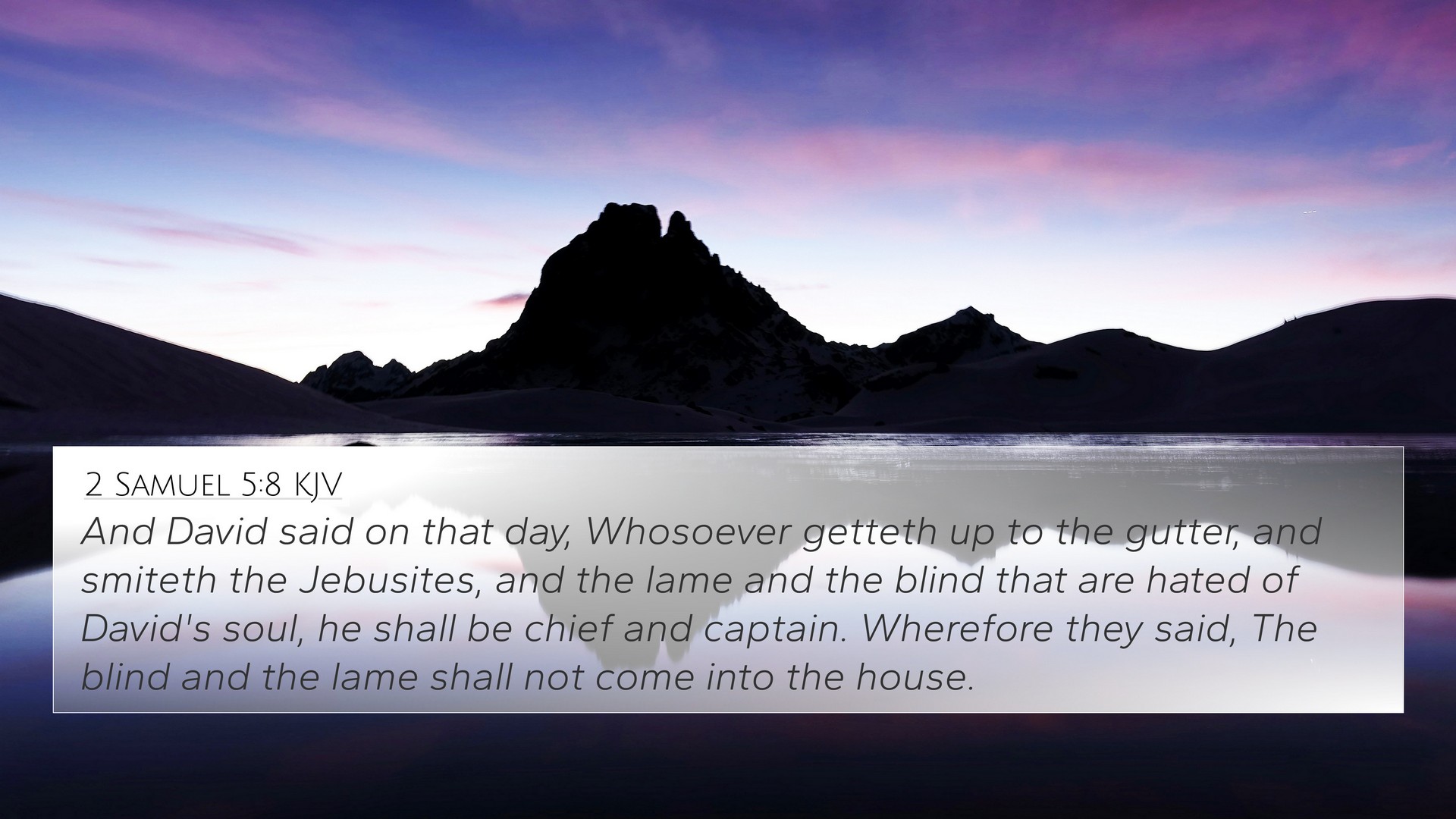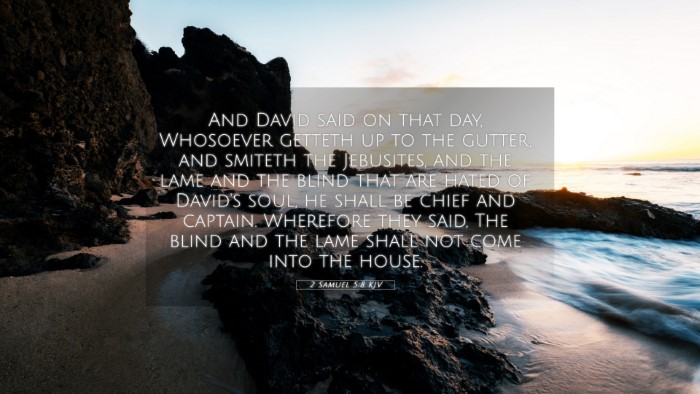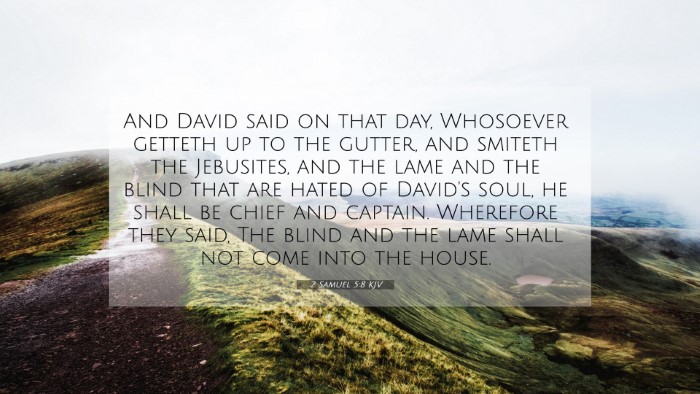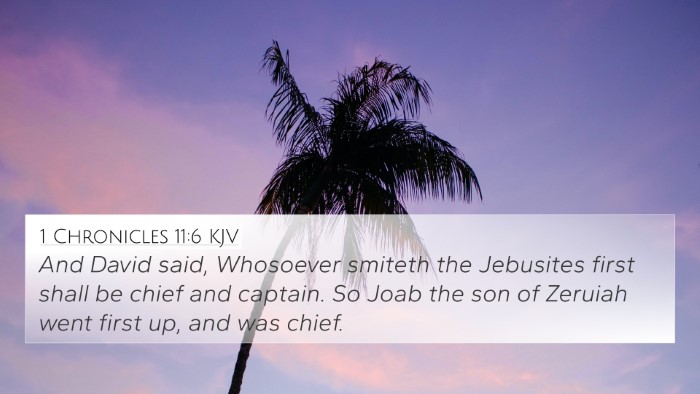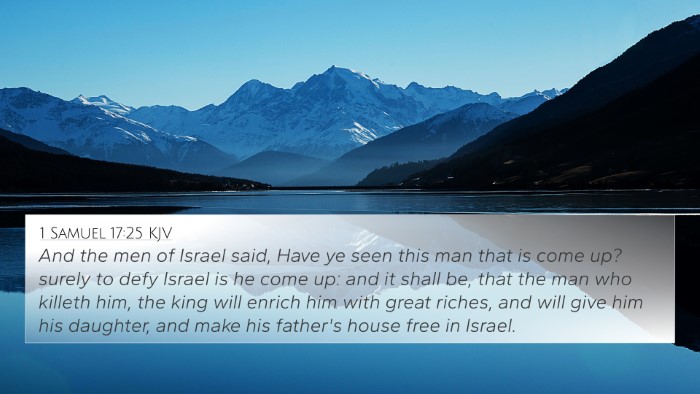Understanding 2 Samuel 5:8
Verse: 2 Samuel 5:8 - "And David said on that day, Whosoever getteth up to the gutter, and smiteth the Jebusites, and the lame and the blind, that are hated of David's soul, he shall be chief and captain. Wherefore they said, The blind and the lame shall not come into the house."
This verse is significant as it illustrates David's military strategy and his determination to capture Jerusalem, which was held by the Jebusites. The mention of the "blind and the lame" can be understood symbolically, indicating that such individuals were seen as an impediment to his rule.
Commentary Insights
-
Matthew Henry's Commentary:
Matthew Henry emphasizes David's boldness and the necessity of strategic thinking in conflict. The "gutter" refers to a specific entry point into the city which was crucial in David's conquest. Henry suggests that David's challenge serves both as motivation for his soldiers and as a metaphor for overcoming obstacles with faith and perseverance.
-
Albert Barnes' Notes:
Barnes explains that David's comment about the "blind and the lame" reflects a form of bravado directed towards the Jebusites, who had boasted that even the weakest defenders could keep David at bay. This provokes an understanding that God’s empowerment can lead one to triumph over seemingly insurmountable challenges.
-
Adam Clarke's Commentary:
Clarke interprets the term "gutter" as possibly referring to a water shaft or drain that could be used to infiltrate the city. This insight portrays the significance of using wisdom and cunning in warfare. Clarke also highlights the divisive nature of such derogatory terms towards the Jebusites, showing a psychological edge in battle.
Cross-References
2 Samuel 5:8 has various connections within the Bible that further deepen our understanding. Below is a list of related verses:
- Joshua 15:63 - Discusses the Jebusites living in Jerusalem, setting the historical context.
- 1 Chronicles 11:4-7 - Describes David’s capture of Jerusalem and his selection of Jerusalem as his capital.
- Psalm 122:1-2 - Expresses a deep affection for the city of Jerusalem, indicating its spiritual significance.
- Matthew 21:10-11 - Connects to Jesus' entry into Jerusalem and the city’s long-standing importance in God’s plan.
- Isaiah 29:1 - Speaks of the city of Ariel, linking to Jerusalem's enduring historical and prophetic significance.
- Luke 2:4 - Mention's Joseph and Mary's connection to Bethlehem and Jerusalem, demonstrating a continuous lineage in biblical events.
- Acts 1:8 - Relates to the dissemination of the Gospel from Jerusalem, linking its historical military significance to spiritual missions.
- Hebrews 12:22 - Refers to the "city of the living God," symbolically relating to Jerusalem’s prophetic fulfillment.
- Galatians 4:26 - Compares Jerusalem, which is above, as the mother of all, highlighting its spiritual as well as political importance.
- Revelation 21:2 - Speaks of the new Jerusalem, providing an eschatological view of the city’s ultimate relevance.
Applications for Thematic Cross-Referencing
When analyzing 2 Samuel 5:8, it becomes pivotal to consider the rich tapestry of themes throughout the Bible. The act of David confronting the Jebusites can be compared to various biblical scenes where individuals face daunting challenges:
- Difficult Challenges: Just as David faced the fortified city, Jacob faced the angel, and Daniel faced the lions (Genesis 32:24-30; Daniel 6:16-24).
- Victory Through Faith: Demonstrated in the context of David, we see parallels in the stories of Gideon (Judges 7) taking on a vastly superior Midianite army.
- God's Assurance: God's promise to support those who trust in Him, as illustrated in Joshua's conquests.
Conclusion
In sum, 2 Samuel 5:8 is not just a military command; it reflects themes of leadership, faith, and divine favor. The narrative underlines the importance of reliance on God amidst trials and expands through the historical and prophetic dimensions of Jerusalem. By employing tools for Bible cross-referencing, scholars and believers can explore these connections deeply, thereby enriching their understanding of Scripture.
